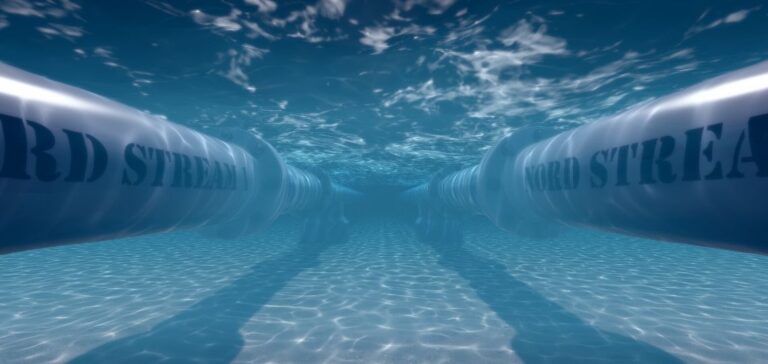The Nord Stream pipeline, which for years enabled the transport of Russian natural gas to Europe, is now at a standstill following the complete suspension of Russian flows. This shift, driven by geopolitical, economic, and environmental factors, raises important questions about the future of this infrastructure and the potential alternatives to ensure Europe’s energy security.
Habeck and Germany’s Position on Nord Stream
German Economy Minister Robert Habeck clearly stated on March 17, 2025, that resuming Russian gas deliveries via Nord Stream would be a “wrong direction.” According to him, Europe should not replace its dependency on Russian gas with a new dependency on liquefied natural gas (LNG) from the United States. Furthermore, Habeck emphasized the importance of supporting Ukraine and focusing on a gradual reduction of fossil fuel imports in favor of developing renewable energy sources. These comments come at a time when Russia continues to influence European energy discussions, especially after Vladimir Putin’s proposal on March 13, 2025, for renewed energy cooperation with Washington to provide more gas to Europe.
Economic Costs of Infrastructure Conversion
One scenario being considered by Europe for the future of the Nord Stream pipelines is to repurpose them for transporting hydrogen (H₂). However, this option represents a significant investment. Experts estimate that converting the existing pipelines to infrastructure for hydrogen could cost between 4 and 5 billion euros for both Nord Stream pipelines. This cost includes necessary modifications to compressor stations, turbines, and pipeline materials, which must be adapted to support hydrogen, a lighter and more aggressive gas for metal infrastructure.
Hydrogen is still an emerging energy source, and its production cost remains high. In 2023, the production price of renewable hydrogen was between 4 and 6 euros per kg, while the price of natural gas remains below 2.5 euros per kg. Additionally, the profitability of converting Nord Stream into hydrogen infrastructure will heavily depend on EU policies, which will need to implement tax incentives and regulations that support this transition.
Alternatives and Necessary Investments
Another option considered by Europe would be to redirect the existing pipelines to new gas suppliers, such as Norway. However, this solution would require additional investments in subsea infrastructure, with the cost estimated at around 3 to 4 billion euros for the new connections. This option remains economically uncertain, as it would compete with existing solutions, such as recently installed LNG terminals in Germany.
LNG, while essential for diversifying supply sources, remains an expensive solution. In 2022, benchmark gas prices in Europe reached record levels of 319.98 €/MWh. Although these prices decreased in 2023 to stabilize around 42.22 €/MWh, LNG supply is still more expensive than pipeline gas deliveries, placing pressure on the energy costs of European businesses.
Asset Depreciation and Abandonment Costs
In the event of abandoning the Nord Stream pipelines, Europe would face a significant economic loss. The construction of the two Nord Stream pipelines cost around 10 billion euros for Gazprom, not including maintenance and operational costs. A total abandonment of this infrastructure would result in a major depreciation of assets, reducing their market value. This depreciation could amount to several billion euros, and the abandonment process would incur additional costs for dismantling and repurposing the infrastructure for other uses.
The impact on European financial markets would also be significant. The suspension of Russian gas flows has already caused price hikes and increased volatility in the energy market, with consequences for production costs in several industrial sectors. European companies must also face considerable investments to replace Russian gas with other sources of supply.
Future Scenarios: An Expensive Energy Transition
The choice between converting Nord Stream infrastructure for hydrogen transport or completely abandoning it represents a major strategic challenge for Europe. Conversion could allow Europe to secure a cleaner long-term gas supply while contributing to the energy transition. However, this option would involve high conversion costs and uncertainties about the profitability of hydrogen as a competitive energy source.
Furthermore, abandoning the pipelines and relying more on LNG imports and renewable energy would increase costs in the short and medium term. According to the International Energy Agency (IEA), transitioning to a decarbonized energy economy in Europe could require investments of more than 30 billion euros over the coming decades to secure the necessary infrastructure and ensure energy supply without relying on fossil fuels.






















